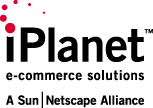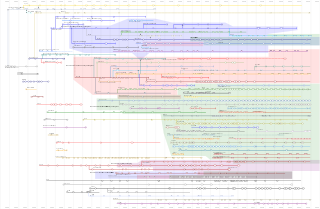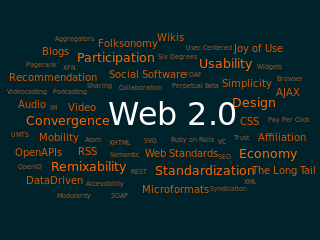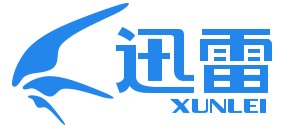Related Research Articles
Netscape Navigator is a discontinued proprietary web browser, and the original browser of the Netscape line, from versions 1 to 4.08, and 9.x. It was the flagship product of the Netscape Communications Corp and was the dominant web browser in terms of usage share in the 1990s, but by around 2003 its user base had all but disappeared. This was partly because the Netscape Corporation did not sustain Netscape Navigator's technical innovation in the late 1990s.

ActiveX is a deprecated software framework created by Microsoft that adapts its earlier Component Object Model (COM) and Object Linking and Embedding (OLE) technologies for content downloaded from a network, particularly from the World Wide Web. Microsoft introduced ActiveX in 1996. In principle, ActiveX is not dependent on Microsoft Windows operating systems, but in practice, most ActiveX controls only run on Windows. Most also require the client to be running on an x86-based computer because ActiveX controls contain compiled code.

iPlanet was a product brand that was used jointly by Sun Microsystems and Netscape Communications Corporation when delivering software and services as part of a non-exclusive cross marketing deal that was also known as "A Sun|Netscape Alliance".

A browser war is a competition for dominance in the usage share of web browsers. The "first browser war" (1995–2001) consisted of Internet Explorer and Netscape Navigator, and the "second browser war" (2004-2017) between Internet Explorer, Firefox, and Google Chrome.
Spyglass, Inc. was an Internet software company. It was founded in 1990, in Champaign, Illinois, as an offshoot of the University of Illinois at Urbana–Champaign, and later moved to Naperville, Illinois. Spyglass was created to commercialize and support technologies from the National Center for Supercomputing Applications (NCSA). It focused on data visualization tools, such as graphing packages and 3D rendering engines.

Web 2.0 refers to websites that emphasize user-generated content, ease of use, participatory culture, and interoperability for end users.
In the technology industry, buzzword compliant is a tongue-in-cheek expression used to suggest that a particular product supports features simply because they are currently fashionable.

The World Wide Web is a global information medium that users can access via computers connected to the Internet. The term is often mistakenly used as a synonym for the Internet, but the Web is a service that operates over the Internet, just as email and Usenet do. The history of the Internet and the history of hypertext date back significantly further than that of the World Wide Web.

Sausage Software was an Australian software company, founded by entrepreneur Steve Outtrim, which produced one of the world's most successful web editors: the HotDog web authoring tool. The product and company name have since been purchased by an Australian consulting firm, SMS Management & Technology.
Netscape Web Server was an integrated software platform for developing and running transaction-oriented business applications on the web. It was developed originally by Kiva Software, which Netscape acquired in 1997.
HotDog is an HTML editor developed by Sausage Software in the mid-1990s. At the time of its development, there were only a small number of HTML editors available on the market and HotDog gathered significant interest due to its ease of use.

Xunlei Limited is a Chinese multinational technology company and an online service provider founded in 2003. The subsidiary of Xunlei Limited, Shenzhen Xunlei Networking Technologies, Co., Ltd. was formerly known as Sandai Technologies (Shenzhen) Inc. and changed its name to Shenzhen Xunlei Networking Technologies, Co., Ltd. in May 2005. Its headquarters are in Nanshan District, Shenzhen.
Openbravo is a Spanish cloud-based SaaS software provider specializing in retail with headquarters in Pamplona, Spain and offices in Barcelona and Lille. The company was formerly known for being a horizontal open-source enterprise resource planning (ERP) software vendor for different industries.
FrameGang was an applet for developing HTML frames for Netscape released by Sausage Software in April 1996. The program featured a drag-and-drop interface that allowed users to define the number, size and position of the HTML frames without knowledge of HTML. It was one of the four "snaglets" along with Crosseye, Flash, and Clickette that were released by Sausage Software that month.
An Internet operating system, or Internet OS, is any type of operating system designed to run all of its applications and services through an Internet client, generally a web browser. The advantages of such an OS would be that it would run on a thin client, allowing cheaper, more easily manageable computer systems; it would require all applications to be designed on cross-platform, open standards; and would not tie a user's applications, documents, and preferences to a single computer, but rather place them in the Internet cloud. The Internet OS has also been promoted as the perfect type of platform for software as a service.
Egor was an early computer animation program for making animations in Java released by Sausage Software on February 6, 1996, as the first commercial Java applet. The software allowed for the creation of animated graphics with sounds to be deployed as a java applet for use through a web browser. Egor featured a user-friendly interface, tutorials, and sample images and designed for use by non programmers with minimal knowledge of HTML. The software is named after Igor, the mad scientist.
Mozilla is a free software community founded in 1998 by members of Netscape. The Mozilla community uses, develops, publishes and supports Mozilla products, thereby promoting exclusively free software and open standards, with only minor exceptions. The community is supported institutionally by the non-profit Mozilla Foundation and its tax-paying subsidiary, the Mozilla Corporation.
Kiva Software was the leading provider and pioneer of internet application server software. Kiva Software released the industry's first application server in January 1996, offering companies a robust platform on which to develop and deploy transaction-oriented business applications on the Web. Kiva's customers included Bank of America, E-Trade, Travelocity, Internet Shopping Network, Hong Kong Telecom and Pacific Bell Internet.

Eric Thich Vi Ly is an American entrepreneur and investor. Ly was co-founder of LinkedIn, a social networking site designed specifically for the business community, where he served as its founding chief technology officer. He is currently the CEO and founder of a blockchain based trust protocol Hub, as well as the CEO and co-founder of KarmaCheck providing candidate's background checks.
Web3 is an idea for a new iteration of the World Wide Web which incorporates concepts such as decentralization, blockchain technologies, and token-based economics. Some technologists and journalists have contrasted it with Web 2.0, wherein they say data and content are centralized in a small group of companies sometimes referred to as "Big Tech". The term "Web3" was coined in 2014 by Ethereum co-founder Gavin Wood, and the idea gained interest in 2021 from cryptocurrency enthusiasts, large technology companies, and venture capital firms. The concepts of Web3 were first represented in 2013.
References
- ↑ Australian Financial Review Sep 2014 "How Small Tech Company Urbanise Tapped Big Asian Money"
- ↑ Burners.Me Dec 2014 "What's In A Name"
- ↑ Borland Delphi News "Sausage dumps 'unstable' Visual Basic, adopts Delphi"
- ↑ Smart Computing, October 1997 Editorial.
- ↑ ITWire Mar 2008 Be the Next Big Thing in open source Archived 22 November 2008 at the Wayback Machine
- ↑ Computerworld Oct 1997 HotDog still sizzles, Snaglets off menu says Sausage Man Archived 28 September 2011 at the Wayback Machine
- ↑ Wired magazine 5.05 May 1997 Hot Links
- ↑ Atari SIG historical archive Five Days at Computer = $7.5 Mil
- ↑ Wired magazine issue 8.07 Melbourne one of 46 global Venture Capitals
- ↑ [ citation needed ]
- ↑ Sydney Morning Herald April 1996 IRC chat with Steve Outtrim
- ↑ Sausage Software and SMS merger [ dead link ]. ZDNet
- ↑ ARNNet Agnes King 3 July 2000 The Sausage maker jumps from barbie to pool
- ↑ Business Week May 1996 Java's Cup Runneth Over
- ↑ xent.com May 97 eVend
- ↑ Computerworld 2000 Sausage Founder Cashes in his Chips
- ↑ The Age 2003 Outtrim Puts His Money Where His Mouth Is
- ↑ Computerworld 2009 Cisco taps Australian expertise for global venture Archived 19 March 2009 at the Wayback Machine
- ↑ ITWire 2009 Majitek opens Middle East base, appoints new CEO Archived 11 February 2009 at the Wayback Machine
- ↑ Business Review Weekly 2014 Sausage machine: How former ‘dotcom darlings’ pulled off Urbanise IPO
- ↑ Stuff.co.nz Dec 2017 "Demystifying Blockchain"
- ↑ Steve Outtrim. "Because it's today, I can tell you that I voted for @InternetPartyNZ . Love their #AntiSpyBill a party with vision".